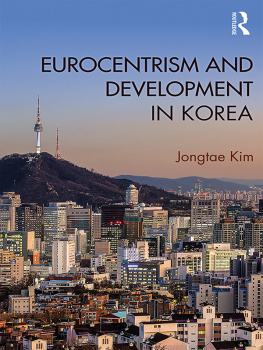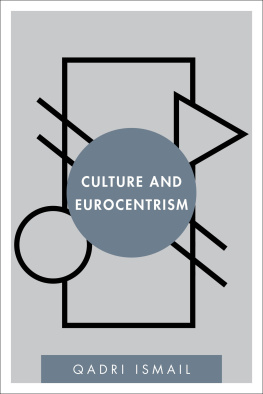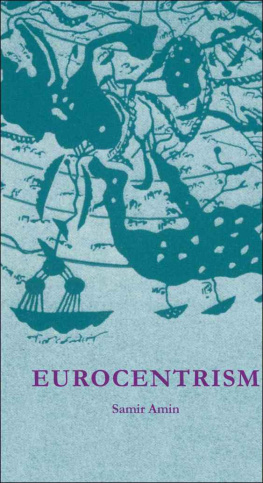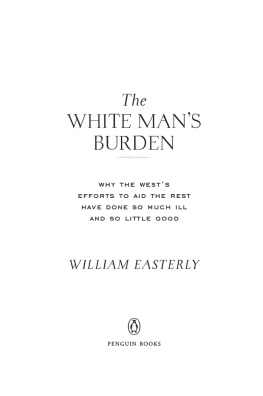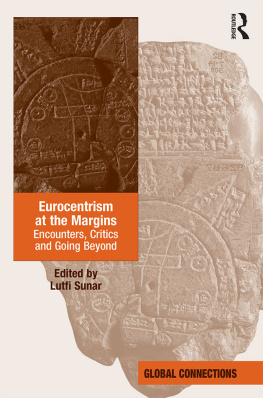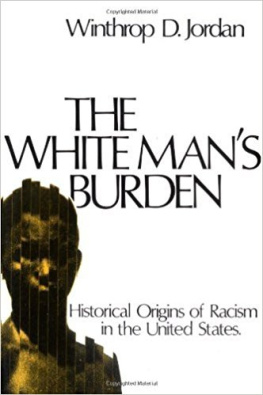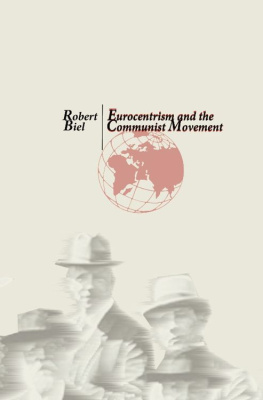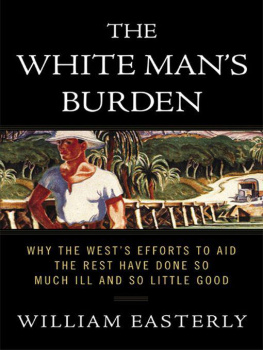Eurocentrism
This book raises awareness of Eurocentrisms enormous impact and shows how, over the course of five centuries, Eurocentrism has extended its power across the globe.
In the twenty-first century, Eurocentrisms hegemony remains powerful. By exploring a wide range of sources including Eurocentric maps and images, historiography and Rudyard Kiplings White Mans Burden, Wintle uncovers Eurocentrisms gradual evolution and reveals the ways in which it functions at both seen and unseen levels. Taking a thematic and then empirical approach, Eurocentrism offers a detailed and comprehensive discussion of Eurocentrisms problems and dangers, pays special attention to the work of Samir Amin and James Blaut, and applies notions garnered in the book to discuss Eurocentrism within the context of the twenty-first-century European Union. This study questions Eurocentrisms function, its history and its importance, providing a fresh insight into one of the worlds most complex and powerful cultural phenomena.
With its multi- and interdisciplinary analysis, this book is an indispensable tool for both scholars and students concerned with modern history, politics, visual culture and political geography.
Michael Wintle is Professor Emeritus of Modern European History at the University of Amsterdam, where until 2019 he was Head of the Department of European Studies. He has published widely on Dutch and European history, including The Image of Europe (2009), European Identity and the Second World War (ed. with M. Spiering, 2011), The Historical Imagination in Nineteenth-Century Britain and the Low Countries (ed. with H. Dunthorne, 2013) and Narratives of War (ed. with N. Adler and R. Ensel, 2019).
Eurocentrism
History, Identity, White Mans Burden
Michael Wintle
First published 2021
by Routledge
2 Park Square, Milton Park, Abingdon, Oxon OX14 4RN
and by Routledge
52 Vanderbilt Avenue, New York, NY 10017
Routledge is an imprint of the Taylor & Francis Group, an informa business
2021 Michael Wintle
The right of Michael Wintle to be identified as author of this work has been asserted by him in accordance with sections 77 and 78 of the Copyright, Designs and Patents Act 1988.
All rights reserved. No part of this book may be reprinted or reproduced or utilised in any form or by any electronic, mechanical, or other means, now known or hereafter invented, including photocopying and recording, or in any information storage or retrieval system, without permission in writing from the publishers.
Trademark notice: Product or corporate names may be trademarks or registered trademarks, and are used only for identification and explanation without intent to infringe.
British Library Cataloguing-in-Publication Data
A catalogue record for this book is available from the British Library
Library of Congress Cataloging-in-Publication Data
Names: Wintle, Michael J., author.
Title: Eurocentrism : History, Identity, White Mans Burden / Michael Wintle.
Description: London ; New York, NY : Routledge/Taylor & Francis Group, 2021. | Includes bibliographical references and index.
Identifiers: LCCN 2020014321 | ISBN 9780367857004 (hardback) | ISBN 9780367856984 (paperback) | ISBN 9781003014461 (ebook)
Subjects: LCSH: EurocentrismHistory. | HistoriographyPhilosophy. | Civilization, WesternPhilosophy. | Kipling, Rudyard, 18651936. White mans burden. | Developing countriesDependency on foreign countries. | Amin, Samir. | Blaut, James M. (James Morris)
Classification: LCC D13.2 .W55 2021 | DDC 303.48/24dc23
LC record available at https://lccn.loc.gov/2020014321
ISBN: 978-0-367-85700-4 (hbk)
ISBN: 978-0-367-85698-4 (pbk)
ISBN: 978-1-003-01446-1 (ebk)
Typeset in Bembo
by Apex CoVantage, LLC
It might seem a little strange to write a book about Eurocentrism when for most of my working life I have been employed in distinguished university departments of European Studies, latterly in a very large one in Amsterdam. My tendency to be critical of signs of Eurocentrism, at whatever level, has sometimes surprised some of my close colleagues, who (rightly) see their focus on Europe as self-evidently justifiable. However, those at the University of Amsterdam have been more than tolerant and even enthusiastic about that line of academic enquiry which has increasingly occupied me for the last decade. Indeed, when I retired officially from the department in 2019, my colleagues presented me with a liber amicorum on precisely that subject, Eurocentrism in European History and Memory,1 with a dozen chapters by friends in the department and from elsewhere. It was a moving testament to how these Europeanists have been more than prepared to engage with me (and others) in reflecting on the issues surrounding the study of Europe through a host of disciplines, which is of course what we do in European Studies. So I would like to thank my colleagues especially for their encouragement and support, even when I appeared to be challenging their (our) own discipline. Very many scholars in Amsterdam and elsewhere have inspired and helped me and commented on my investigations and notions; I cannot possibly thank them all, and so I will only mention a very few who have been especially important to me when conceiving and writing this book. In terms of inspiration, I want to name three whom I have never actually met, though I feel I have known them quite well through their work: James Blaut, Samir Amin and Jan Nederveen Pieterse have been crucial to my own interest in and understanding of Eurocentrism. And at Amsterdam my proximus Joep Leerssen has constantly been a stimulating friend and interlocutor, challenging and supporting on all manner of subjects, not least Eurocentrism.
Brolsma, et al. (eds.), Eurocentrism in European History and Memory.
For a number of years I taught a well-attended course on Eurocentrism across the Humanities Faculty and beyond: on many occasions students remarked to me how surprising and eye-opening the approach was for them. A couple of them even playfully suggested that the course should be compulsory for all, rather as were those old Western Civ. courses in the United States, which I critique here in . I immensely enjoyed those classes, and I always thought it a great privilege to be allowed to teach them. The students responses have helped shape the chapters here, and it is to those many hundreds of students to whom I gratefully dedicate this book.
In writing previous books I have been aware of the Eurocentric assumptions which underpin much of Western thought and scholarship: that was part of the motivation for writing this one. I have tried to be self-reflexive here when using certain loaded expressions for example, White Mans Burden; I have almost certainly not always succeeded, but I hope that my efforts will be taken in the spirit in which they are intended. I am also aware that I sometimes use the first-person plural to make assertions, drawing the reader into my contention and asking her or him to share an exploration of the view I am expressing. It is a harmless enough convention, perhaps, but in the case of Eurocentrism, it is possible that certain readers may not be, or may not wish to be, in any way associated with the epithets European or Western. That is of course not my intention, and I offer my apologies to anyone who may feel uncomfortable about it.



